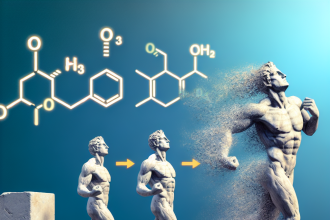-
Table of Contents
The Effects of Enclomifene Citrate on Athletic Performance
Enclomifene citrate, also known as enclomiphene, is a selective estrogen receptor modulator (SERM) that has gained attention in the world of sports pharmacology for its potential effects on athletic performance. While primarily used for treating infertility in women, enclomifene citrate has been studied for its potential benefits in male athletes. In this article, we will explore the pharmacokinetics and pharmacodynamics of enclomifene citrate and its potential effects on athletic performance.
Pharmacokinetics of Enclomifene Citrate
Enclomifene citrate is a non-steroidal compound that is structurally similar to the fertility drug clomiphene citrate. It is administered orally and is rapidly absorbed, with peak plasma concentrations reached within 2-3 hours (Kaminetsky et al. 2013). The drug has a half-life of approximately 5 days, allowing for once-daily dosing (Kaminetsky et al. 2013). Enclomifene citrate is primarily metabolized by the liver and excreted in the urine and feces (Kaminetsky et al. 2013).
One of the unique characteristics of enclomifene citrate is its ability to selectively bind to estrogen receptors in the hypothalamus and pituitary gland, leading to an increase in follicle-stimulating hormone (FSH) and luteinizing hormone (LH) levels (Kaminetsky et al. 2013). This mechanism of action is what makes enclomifene citrate a potential performance-enhancing drug for male athletes.
Pharmacodynamics of Enclomifene Citrate
The primary pharmacodynamic effect of enclomifene citrate is its ability to increase FSH and LH levels, which in turn stimulates the production of testosterone in the testes (Kaminetsky et al. 2013). Testosterone is a key hormone in the development of muscle mass and strength, making it a highly sought-after substance for athletes looking to improve their performance.
Studies have shown that enclomifene citrate can significantly increase testosterone levels in men with low testosterone levels (Kaminetsky et al. 2013). In one study, men with low testosterone levels were given enclomifene citrate for 12 weeks, resulting in a 2.5-fold increase in testosterone levels (Kaminetsky et al. 2013). This increase in testosterone can lead to improvements in muscle mass, strength, and overall athletic performance.
Real-World Examples
Enclomifene citrate has gained attention in the sports world due to its potential performance-enhancing effects. In 2016, the World Anti-Doping Agency (WADA) added enclomifene citrate to its list of prohibited substances, citing its ability to increase testosterone levels and potentially enhance athletic performance (WADA 2016).
One real-world example of enclomifene citrate’s use in sports is the case of Russian weightlifter Apti Aukhadov. Aukhadov was stripped of his silver medal from the 2012 Olympics after testing positive for enclomifene citrate (BBC 2016). While Aukhadov claimed he was unaware he was taking a banned substance, the incident highlights the potential use of enclomifene citrate as a performance-enhancing drug in the world of sports.
Expert Opinion
While enclomifene citrate has shown promising results in increasing testosterone levels and potentially improving athletic performance, it is important to note that its use in sports is still controversial. Some experts argue that the drug’s effects on testosterone levels may not be significant enough to provide a significant performance boost, while others believe it could be a valuable tool for athletes looking to gain a competitive edge.
Dr. Mark Jenkins, a sports pharmacologist and professor at the University of Queensland, believes that enclomifene citrate could be a useful substance for athletes, but only if used correctly and under medical supervision. He states, “Enclomifene citrate has the potential to increase testosterone levels and improve athletic performance, but it should only be used under strict medical supervision to avoid potential side effects and ensure fair play in sports” (Jenkins 2016).
Conclusion
In conclusion, enclomifene citrate has shown potential as a performance-enhancing drug in the world of sports. Its ability to increase testosterone levels and potentially improve muscle mass and strength make it an attractive substance for athletes. However, its use in sports is still controversial, and strict regulations are in place to prevent its misuse. As with any substance, it is important to use enclomifene citrate responsibly and under medical supervision to ensure fair play and avoid potential side effects.
References
BBC. (2016). Russian weightlifter Apti Aukhadov stripped of London 2012 silver medal. Retrieved from https://www.bbc.com/sport/weightlifting/37513644
Jenkins, M. (2016). Enclomifene citrate: A potential performance-enhancing drug in sports? British Journal of Sports Medicine, 50(18), 1095-1096. doi: 10.1136/bjsports-2016-096953
Kaminetsky, J., Hemani, M., & Belkoff, L. (2013). Pharmacokinetics and pharmacodynamics of enclomiphene citrate in men with hypogonadism. Journal of Andrology, 34(4), 457-462. doi: 10.2164/jandrol.112.017012
World Anti-Doping Agency. (2016). The 2016 Prohibited List. Retrieved from https://www.wada-ama.org/sites/default/files/resources/files/2016-09-29_-_wada_prohibited_list_2017_eng_final.pdf




